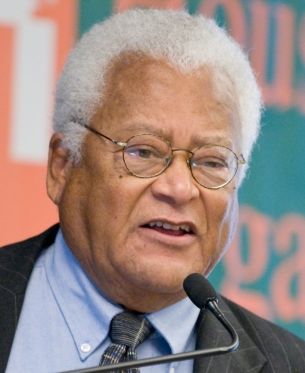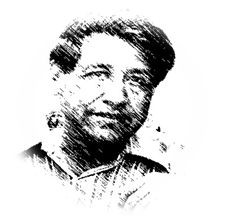
|
||||||||||||||||
Click image for bio
 (from Wikipedia)
James Morris Lawson, Jr. (born September 22, 1928) was a leading theoretician and tactician of nonviolence within the American Civil Rights Movement. He continues to be active in training activists in nonviolence.
(from Wikipedia)
James Morris Lawson, Jr. (born September 22, 1928) was a leading theoretician and tactician of nonviolence within the American Civil Rights Movement. He continues to be active in training activists in nonviolence.
Born in Uniontown, Pennsylvania, Lawson grew up in Massillon, Ohio. While a freshman at Baldwin Wallace College in Berea, Ohio, he joined the Fellowship of Reconciliation (FOR), an organization founded by A.J. Muste, and the Congress of Racial Equality (CORE), an organization affiliated with FOR. Both FOR and CORE advocated nonviolent resistance to racism; CORE conducted sit-ins in some northern cities in the late 1940s and embarked on a freedom ride more than a decade before the more famous ones of the early 1960s.
Consistent with those principles of nonviolence, Lawson declared himself a conscientious objector and refused to report for the draft in 1951. He served fourteen months in prison after refusing to take either a student or ministerial deferment.
After his release from prison, Lawson went as a Methodist missionary to Nagpur, India, where he studied satyagraha, the principles of nonviolence resistance that Mohandas Gandhi and his followers had developed.[2] He returned to the United States in 1955, entering the Graduate School of Theology at Oberlin College in Ohio.
Work with Martin Luther King Jr. and the Nashville Student Movement
One of his Oberlin professors introduced him to Martin Luther King, Jr., who had led the Montgomery Bus Boycott in Montgomery, Alabama and had also embraced Gandhi's principles of nonviolent resistance. King urged Lawson to come South, telling him "Come now. We don't have anyone like you down there."
Lawson moved to Nashville, Tennessee and enrolled at the Divinity School of Vanderbilt University, where he served as the southern director for CORE and began conducting nonviolence training workshops for the Southern Christian Leadership Conference. While in Nashville, Lawson met and mentored a number of young students at Vanderbilt, Fisk University, and other area schools in the tactics of nonviolent direct action. In Nashville, Lawson trained many of the future leaders of the 1960s Civil Rights Movement, among them Diane Nash, James Bevel, Bernard Lafayette, Marion Barry, and John Lewis. In 1959 and 1960 these and other Lawson-trained activists launched the Nashville sit-ins to challenge segregation in downtown stores. Along with activists from Atlanta, Georgia and elsewhere in the South, they formed the Student Nonviolent Coordinating Committee (SNCC) in April 1960.
Lawson's students played a leading role in the Open Theater Movement, the Freedom Rides, the 1963 March on Washington, Mississippi Freedom Summer the Mississippi Freedom Democratic Party, the 1963 Birmingham Children's Crusade, the 1965 Selma Voting Rights Movement, and the 1966 Chicago Open Housing Movement over the next few years.
Lawson's expulsion from Vanderbilt as a result of these activities became one of the celebrated incidents of the era and eventually a source of deep embarrassment to the university. During the 2006 graduation ceremony Vanderbilt apologized for its treatment of Lawson; he is now a member of its faculty.
In 1962 Lawson brought Dr. King and James Bevel together for a meeting which resulted in the two agreeing to work together as equals. Bevel was then named SCLC's Director of Direct Action and Director of Nonviolent Education.
Work in Memphis
Lawson became pastor of Centenary Methodist Church in Memphis, Tennessee in 1962. In 1968, when black sanitation workers went on strike for higher wages and union recognition after two of their co-workers were accidentally crushed to death, Reverend Lawson served as chairman of their strike committee. (See Memphis Sanitation Strike)
Reverend Lawson invited Dr. King to Memphis in April 1968 to dramatize their struggle, which had adopted the slogan I am a Man. Dr. King delivered his famous "Mountaintop" speech in support of the strike in Memphis on April 3, 1968, the day before his assassination.
Links:- A short UK page on Lawson
- Vanderbilt Announces Distinguished Alumnus award
- A Force More Powerful - Interview: Rev. James Lawson
- Lawson to Return to Vanderbilt as Professor
- “The Rev. James Lawson: An Advocate of Peaceful Change” NPR
- Oral History Interview with James M. Lawson
- The Non-Violent Struggle. Course Podcast series from Rev. James Lawson, Fall 2007, Vanderbilt University.
